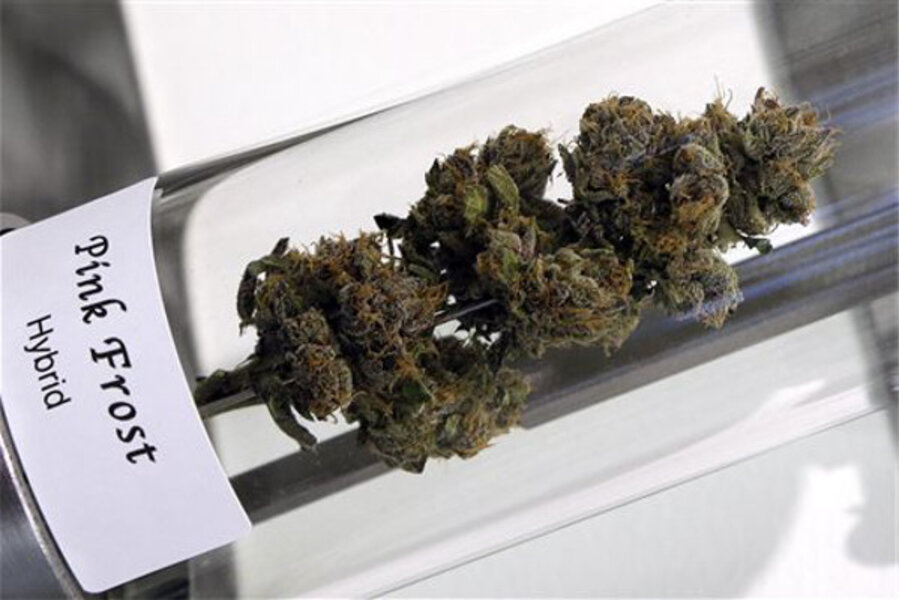Native American tribes can now grow and sell marijuana: Do they want to?
Loading...
| GRANTS PASS, Ore.
Native American tribes can grow and sell marijuana on their lands as long as they follow the same federal conditions laid out for states that have legalized the drug, the US Justice Department said Thursday.
Some advocates said the announcement could open new markets across the country and give rise to a rich new business on reservations, not unlike the advent of casino gambling. Others said it was too early to tell; many tribes oppose legalization, and only a handful of tribes have expressed any interest in the marijuana business.
Oregon US Attorney Amanda Marshall said that the Justice Department policy addresses questions raised by tribes about how legalization of pot in states like Oregon, Washington and Colorado would apply to sovereign Native lands.
"That's been the primary message tribes are getting to us as US attorneys," Marshall said from Portland. "What will the US as federal partners do to assist tribes in protecting our children and families, our tribal businesses, our tribal housing? How will you help us combat marijuana abuse in 'Indian Country' when states are no longer there to partner with us?"
Whether tribal pot could become a major bonanza rivaling tribal casinos is a big question. Marshall said only three tribes — one each in California, Washington state and the Midwest — have voiced any interest. She did not identify them.
Seattle attorney Anthony Broadman, whose firm represents tribal governments throughout the West, said the economic potential is vast. "If tribes can balance all the potential social issues, it could be a really huge opportunity," Broadman said.
But many Natives are wary of compounding existing drug and alcohol problems by growing and selling pot.
The Yakama Nation in Washington state recently banned marijuana on the reservation and is trying to halt state regulated pot sales and grows on lands off the reservation where it still holds hunting and fishing rights. The Hoopa Valley Tribe in Northern California has battled illegal pot plantations on its reservation that have damaged the environment.
In South Dakota, the Oglala Sioux Tribal Council this year rejected a proposal to allow marijuana.
Oglala Sioux tribal Councilwoman Ellen Fills the Pipe, chairwoman of the council's Law and Order Committee, said Thursday she needs to review the federal policy more thoroughly but that given her long background in law enforcement, she opposes loosening marijuana laws.
"For me, it's a drug," Fills the Pipe said. "My gut feeling is we're most likely going to shoot it down."
In Oregon, former Klamath Tribes chairman Jeff Mitchell said communities everywhere deal with drug and alcohol issues, and tribes are likely to proceed carefully.
"I have confidence in tribal government that they will deal with it appropriately and they'll take into consideration social and legal aspects, as well as other implications that go along with bringing something like that into a community," Mitchell said.
Marshall warned that marijuana is still illegal under federal law. Problems could arise for tribes with lands in states that outlaw marijuana due to the likelihood that pot would be transported or sold outside tribal boundaries, she said.
Tribes selling marijuana may not be subject to state and local taxes, allowing them to undercut off-reservation sales. In Washington, heavy taxes on recreational pot have pushed the price to about twice the price at medical marijuana dispensaries.
Alison Holcomb, a primary drafter of Washington state's legalization measure, said most people in larger states won't want to drive to far-flung reservations to buy pot. "The reality is that so much of the market depends on convenience, it's not just price that drives consumer choices," Holcomb said.
John Evich disagreed. He runs one of the five legal marijuana stores in the northwest Washington city of Bellingham, near the Nooksack and Lummi reservations. When he chewed tobacco, he said, he used to stop at the Nooksack reservation to stock up because it was about 30 percent cheaper there. He had little doubt people would do the same if tribes began selling pot.
The Nooksack and Lummi tribes did not immediately respond to messages seeking comment Thursday.
Marshall said with 566 tribes around the country recognized by the federal government, there will be a lot of consulting going on between tribal leaders and federal prosecutors. As sovereign nations, some tribes have their own police, some rely on federal law enforcement, and some call in state and local police.
With limited resources and vast amounts of territory to cover, federal prosecutors will not prosecute minor cases, Marshall said.
The tribal policy is based on an August 2013 Justice Department announcement that the federal government wouldn't intervene as long as legalization states tightly regulate the drug and take steps to keep it from children, criminal cartels and federal property.
US attorneys also reserve the right to prosecute trafficking, firearms violations and possession of marijuana on federal property.
___
Wozniacka reported from Portland, Oregon. Associated Press writers Eugene Johnson in Seattle and James Nord in Pierre, South Dakota, contributed to this story.







